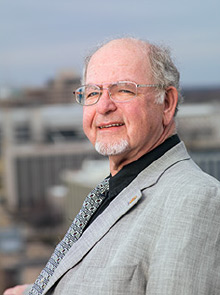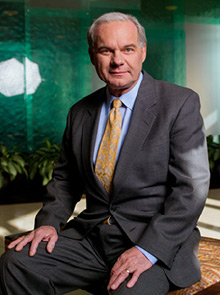
 Grand Rapids, the medical hub of West Central Michigan, is often described as a community of givers, a nod to the families that built their corporate empires there (including Amway Corp. and Steelcase) and generously donated millions to build several state-of-the-art medical facilities. Many of these buildings were constructed without the health systems that own them assuming any debt—a "spend-only-what-you-have" approach that many attribute to the enduring social values of the Dutch immigrants who settled here in the late 1800s.
Grand Rapids, the medical hub of West Central Michigan, is often described as a community of givers, a nod to the families that built their corporate empires there (including Amway Corp. and Steelcase) and generously donated millions to build several state-of-the-art medical facilities. Many of these buildings were constructed without the health systems that own them assuming any debt—a "spend-only-what-you-have" approach that many attribute to the enduring social values of the Dutch immigrants who settled here in the late 1800s.
"We're talking about a conservative community…that places a great emphasis on value, doesn't want to spend needlessly, and wants to get the biggest bang for the buck," says Lody Zwarensteyn, former president of the Alliance for Health, a community coalition. In an effort to prevent new construction and purchases of expensive equipment from sparking the equivalent of an arms race, as they have in many other U.S. cities, the alliance convenes community leaders to review and recommend whether the state should approve such investments. In one instance, it recommended that two competing health systems share a PET scanner rather than purchase two. The group also advocates for greater price transparency and sponsors a collaboration among health care providers to test value-based payment models.

This sort of regional planning and stewardship has freed up resources to support the development of adult and pediatric transplant programs in a city with less than 200,000 residents. "This is a small town that plays well above its weight class," says Steve Heacock, senior vice president of Spectrum Health, the health system created when community leaders demanded that two competing hospitals merge, a move that led to the creation of a community foundation that devotes $6 million annually to population health initiatives.

The spirit of social responsibility extends to physicians and patients as well, says John O’Donnell, M.D., who directs the preclinical curriculum for medical students at Michigan State University’s College of Human Medicine, which recently expanded its campus in Grand Rapids. It’s not uncommon for doctors to make home visits when needed and patients can be equally committed to their doctors, he says. "People here are very responsible. They follow instructions. They pay their bills…[and] it makes it easier to provide good care."



Adam Bird

Adam Bird

Adam Bird
